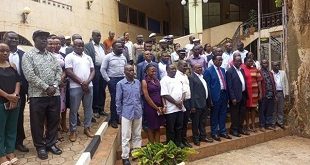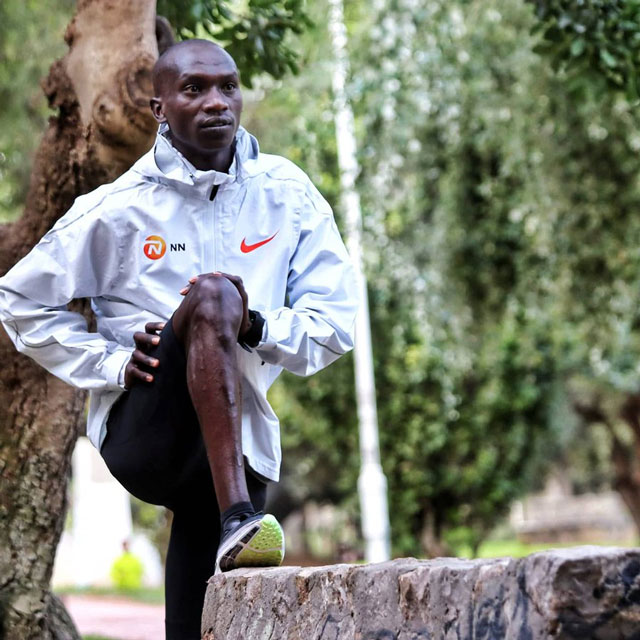
Kampala, Uganda | THE INDEPENDENT | If there is one thing likely to push Joshua Cheptegei to the limit in 2021, it is the fear that winning an Olympic double might not be enough to confirm him as the legend he has always dreamt of becoming.
“I always told my coach and manager I want to be a legend, and they told me ‘then you have to try to break a world record on the track,’ the 24-year-old Ugandan ace told BBC World Service Sport in an interview last night.
Cheptegei did exactly that – breaking records – this year, shattering the 5000m and 10000m track world records, on top of a fastest ever time in the 5km road race. Those feats have already made him a legend, but the fact that he was not eventually handed the ultimate crown, the IAAF World athlete of the year award, left a bitter taste, which will drive him on in 2021.
The Ugandan ace has been edged out at the IAAF annual award in consecutive years.
In 2019, when he had won the world cross-country title in Aarhus, became world 10,000m champion in a world-leading 26:48.36 and took the Diamond League 5000m title, he was still edged out by legend Eliud Kipchoge. Kipchoge took the award mainly by becoming the first man to run the marathon below two hours – 1:59:40.2 for the 42.195km marathon in Vienna.
The race in Vienna was one of the made-for-records races in which pace setters are used. In this case Uganda’s Jacob Kiplimo was one of up to a dozen pace setters used that day.
In 2020, Cheptegei was shortlisted for the IAAF award after breaking three world records, in the 5km road race, and that of the 5000m and 10000m. The last two races happened during the COVID-19 pandemic, and were like Kipchoge’s race a year earlier, made-for-records races, with pace setters and even the new introduction of pace lights on the track.
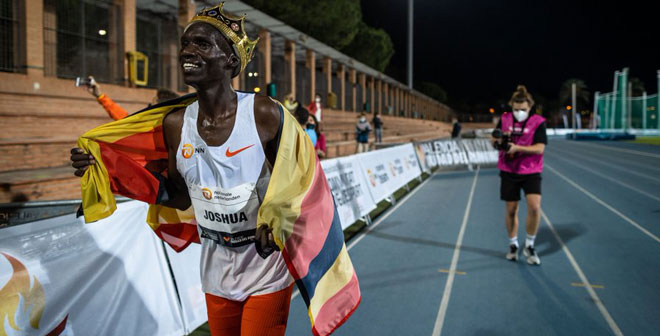
When the time came, the IAAF award for athlete of the year instead went to pole vaulter Mondo Duplantis,21, of Sweden. Duplantis broke the world record in the pole vault twice (6.17m and 6.18m) before producing the highest outdoor vault of all time of 6.15m.
Opinion from athletics experts was that Duplantis had been considered over Cheptegei, because the Ugandan broke records at races where pace setters had been used!
Not even the a vote from Kipchoge, acknowledging Cheptegei as the world’s outstanding athlete of 2020, was enough to push Cheptegei over the line.
“I’m very honoured that I was two times the World Athletics Male Athlete of the year. For 2020, I wish my NN Running Team teammate Joshua Cheptege all the best in this award. He has my vote,” Kipchoge said soon after the shortlist of contenders was released by world athletics governing body IAAF.
I’m very honoroud that I was two times the @WorldAthletics Male Athlete of the year.
For 2020, I wish my @NNRunningTeam teammate @joshuacheptege1 all the best in this award, he has my vote! https://t.co/K3uOpb0tbv
— Eliud Kipchoge – EGH🇰🇪 (@EliudKipchoge) November 4, 2020
There is a three-way voting process to determine the finalists and eventually the winner. The World Athletics Council and the World Athletics Family cast their votes by email, while fans voted online via social media platforms. The Council’s vote counts for 50% of the result, while the Athletics Family’s votes and the public votes each count for 25% of the final result.
No Ugandan has ever won before
If he had been crowned, Cheptegei would have become the first Ugandan to be honored by the world athletics governing body. The awards were first presented in 1988.
This was over a decade after the great John Akii Bua, who would have been a contender then, stunned the Munich 1972 Olympics by breaking the 400m hurdles world record. Akii Bua and Stephen Kiprotich are the only Ugandans to have ever won Olympic gold medals.
On 2 September 1972, in the Olympic Stadium in Munich, Akii-Bua was drawn in Lane One for the 400m hurdles. At 4.31pm local time, he won the gold medal in an astonishing new world record time of 47.82 sec, three-tenths of a second under the world mark set by Britain’s Hemery in the 1968 Mexico Olympics.
HISTORY: Forty seven years ago in Munich, Uganda’s John Akii-Bua 🇺🇬 was the first man to run the 400m hurdles under 48 secondshttps://t.co/agO7YEMF7p
#INEOS159 #Athletics #WorldRecords #KipchogeINEOSChallenge pic.twitter.com/ldCEcGkvmZ
— Louis Jadwong (@Jadwong) October 12, 2019
Amazing year for Cheptegei, stage for 2021 Olympics
It was nevertheless an amazing year for Cheptegei with his three records.
First to fall was the 5000m (12min, 35.36sec) then the 10000m (26min,11sec) followed. He started the year by clinching the world’s best time over 5km (12:51).
“There was no better chance to do it (break records) than this year,’ told BBC World Service Sport. He said it was possible to focus only on breaking records because it was a year that did not have the distractions of constant travel and regular competition because of the COVID-19 pandemic.
Asked how good his records actually were, given the fact he used special shoes, and his made-for-record-races even had track lights to guide him, Cheptegei was confident he would still have broken the records.
Cheptegei wore Nike’s ZoomX Dragonfly spikes, which transplant the sportswear giant’s controversial combination of highly resilient foam and carbon plates to the track.
“The shoes do really help, but they also helped athletes of the past, when some things were available for others and not available for others,” he said.
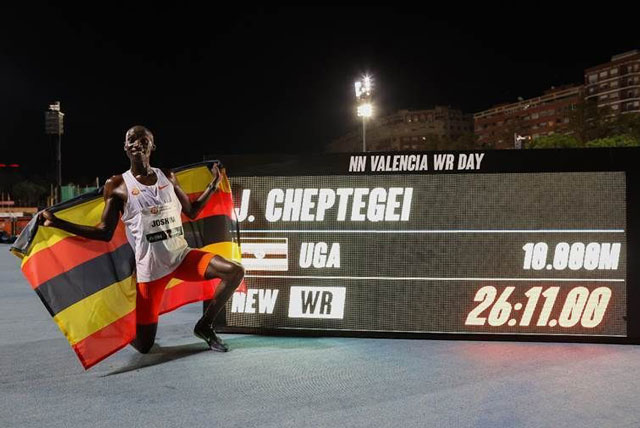
Cheptegei argued that, with the same technology available to all athletes if they want it, he doesn’t have any unfair advantage, saying “but in this case the shoes are not only available to Mr Cheptegei. They are available for everyone who wants to attack the world record.”
“You have seen the likes of Yomif Kejelcha, Selemon Barega…it is not about shoes only, but athletes having this period concentrating more on training and not travelling.
“I was focused on just this one thing. And that was breaking the world record.”
On the the pace setting and lights on track, he said he normally runs without any aids.
“There are a lot of innovations that have taken shape in the sport and people should accept them. I was not looking at the lights during the races. My eyes were actually not on the lights but on lapping.”
He warned that “I can do the same splits even without the help of the pace lights and pace setters. The pace lights are good but they help more the spectators who are watching the events.
Eyes on the prize
“Wow. I think it will be historic If I can make it because we have had only two Olympic gold medals before from Akii-Bua in 1972, and Stephen Kiprotich 40 years later,” said Cheptegei when asked if he can win the rare 5k and 10k double at the Tokyo Olympics.
VIDEO: Akii Bua
” I am looking forward to taking on this great challenge, I will give myself a go at it.” He would become just the eighth man to successfully complete the 5,000m-10,000m double at an Olympic Games if he steps up in Tokyo.
“It is demanding a lot, in terms of racing and mindset but I want to give myself a try to win both gold medals.”
When Cheptegei trains, his coach Addy Ruiter, said, “we have a plan A, B, C and if it fails, D.”
Britain’s Mo Farah did the double at both the London 2012 and at Rio 2016. where Cheptegei competed and now knows what it takes. He ran at the 2016 Summer Olympics in the 5000 metres and 10,000 metres, finishing eighth and sixth respectively
“It would be really amazing to win the double, but if I win gold in the 10,000m I would still be grateful,” Cheptegei told BBC World Service Sport.
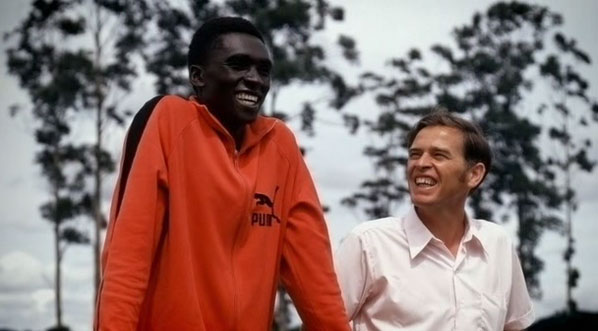
In the foot-steps of Akii Bua
Cheptegei’s feats last year put him in the rare league of world beaters, first achieved by Uganda’s most famous athlete, hurdler John Akii-Bua in 1972. Interestingly, like Akii-Bua, Cheptegei runs for Police.
Akii-Bua’s feat will live in memory. Not only did he brake the world record, he also became the first ever to run under 48 seconds in what is considered a highly technical discipline, the 400m hurdles.
He clocked 47.82 in that Munich Olympics final in Germany to take a phenomenal 0.3 seconds off the record set by the then greatest hurdler David Hemery four years earlier. More remarkable, was he run that final from the inside lane – considered the least favorite position in the one lap race.
After finishing fourth in the 1970 Commonwealth Games and running the fastest time of 1971, he was still not a big favourite for that 1972 Summer Olympics in Munich, having limited competitive experience.
He missed the 1976 Olympics and a showdown with United States rival Edwin Moses because of the boycott by Uganda and other African nations. Edwin Moses went on to set a new world record in 1976 and to reign until Kevin Young became the first man to run under 47 seconds in 1992.
Akii Bua died an unhappy man in 1997, a lesson for many of today’s Ugandan athletes who have now invested heavily in their future, and life after sports.
******
PAST IAAF ATHLETS OF THE YEAR
| Year | Men | Women |
| 1988 | Carl Lewis | Florence Griffith Joyner |
| 1989 | Roger Kingdom | Ana Fidelia Quirot |
| 1990 | Steve Backley | Merlene Ottey |
| 1991 | Carl Lewis | Katrin Krabbe |
| 1992 | Kevin Young | Heike Henkel |
| 1993 | Colin Jackson | Sally Gunnell |
| 1994 | Noureddine Morceli | Jackie Joyner-Kersee |
| 1995 | Jonathan Edwards | Gwen Torrence |
| 1996 | Michael Johnson | Svetlana Masterkova |
| 1997 | Wilson Kipketer | Marion Jones |
| 1998 | Haile Gebrselassie | Marion Jones |
| 1999 | Michael Johnson | Gabriela Szabo |
| 2000 | Jan Železný | |
| 2001 | Hicham El Guerrouj | Stacy Dragila |
| 2002 | Hicham El Guerrouj | Paula Radcliffe |
| 2003 | Hicham El Guerrouj | Hestrie Cloete |
| 2004 | Kenenisa Bekele | Yelena Isinbayeva |
| 2005 | Kenenisa Bekele | Yelena Isinbayeva (2) |
| 2006 | Asafa Powell | Sanya Richards |
| 2007 | Tyson Gay | Meseret Defar |
| 2008 | Usain Bolt | Yelena Isinbayeva (3) |
| 2009 | Usain Bolt | Sanya Richards (2) |
| 2010 | David Rudisha | Blanka Vlašić |
| 2011 | Usain Bolt | Sally Pearson |
| 2012 | Usain Bolt | Allyson Felix |
| 2013 | Usain Bolt | Shelly-Ann Fraser-Pryce |
| 2014 | Renaud Lavillenie | Valerie Adams |
| 2015 | Ashton Eaton | Genzebe Dibaba |
| 2016 | Usain Bolt | Almaz Ayana |
| 2017 | Mutaz Essa Barshim | Nafissatou Thiam |
| 2018 | Eliud Kipchoge | Caterine Ibargüen |
| 2019 | Eliud Kipchoge | Dalilah Muhammad |
SOURCE: wikipedia
RELATED VIDEO:
 The Independent Uganda: You get the Truth we Pay the Price
The Independent Uganda: You get the Truth we Pay the Price

